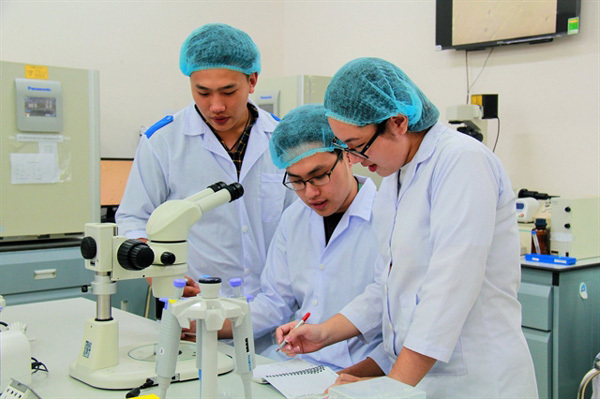 Society
Society

HCM City will need to promote the application of Artificial Intelligence (AI) in the education sector as part of its effort to become a smart city by 2030, experts said.

|
| Students do research in a lab at the Việt Nam National University in HCM City. — Photo courtesy of the university |
HCM CITY — HCM City will need to promote the application of Artificial Intelligence (AI) in the education sector as part of its effort to become a smart city by 2030, experts said.
Education is among 10 key sectors on which the city has focused to develop its digital economy, in addition to healthcare, transportation, finance-banking, tourism, agriculture, logistics, environment, energy, and human resources.
The city has assigned its Department of Education and Training to implement a project to develop human resources for AI through education and training, focusing on research and development of technologies using AI.
The project will also enhance academic links with foreign AI professionals.
The city hosts a number of universities and science research institutes, especially the Việt Nam National University, which focus on training and research in AI to build an AI eco-system.
Phạm Thị Bé Hiền, principal of Lê Hồng Phong High School for the Gifted in District 5, said the school has included AI teaching in some specialised classes for the last three years.
However, one of the challenges facing the school is a lack of AI teachers and the equipment needed for teaching AI, which cost too much, she said.
She added that it was important to have high-quality human resources with the capacity to understand the latest technologies and innovations.
Nguyễn Bảo Quốc, deputy director of the city’s Department of Education and Training, said from the 2022-23 academic year, the city will implement a pilot programme to include AI teaching on the syllabus at secondary and high schools.
Under the pilot scheme, students will study AI through infomatics and a series of clubs, extracurricular activities and contests for science, legos and robotics.
To ensure the AI teaching project runs well, the education sector is stepping up preparation for personnel and facilities, according to Bảo.
The department has been running AI training courses for IT teachers at high schools.
Schools should call for private investment to build smart rooms and multi-functional classrooms and buy essential equipment, robots, and automated devices, he added.
Schools should also offer AI playgrounds to make the teaching go smoothly, he added.
“Teaching AI at high schools is part of an important project,” Bảo said.
AI scheme
Dương Anh Đức, deputy chairman of the city People’s Committee, recently authorised a programme on “research and development of AI applications in HCM City for the 2020-30 period”.
Under the programme, a database of all sectors, including education, housing, transport, environment and healthcare, will share data among all the city’s administrative departments.
This will help social organisations, businesses and residents have better access to public information and services online provided through mobile devices and other means, according to Đức.
It will also focus on developing start-ups and small- and medium-sized enterprises (SMEs) in the field of AI.
It is encouraging businesses to apply AI to enhance competitiveness and is also calling for investment in the field and promotion of AI products made by Vietnamese.
It is calling for investment in AI, telecommunications and IoT infrastructure, and e-identification platforms in order to develop a digital government and economy.
The city will set up AI hubs that will include AI training centres, AI research clutters and a centre for AI start-ups, which will be connected with one another through the city’s data centre and infrastructure.
It will also issue mechanisms and policies on AI to create a legal framework for AI research and development.
The city aims to increase by 20 per cent per year the number of scientific works, AI patents and AI applications, and invite leading AI experts to work short or long term in the city. — VNS




